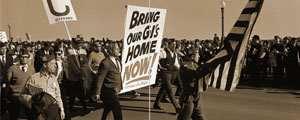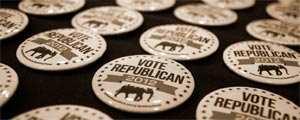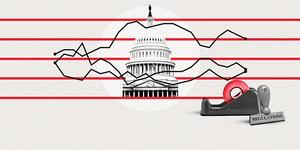A half-century ago, 48% of Americans thought "political favoritism and corruption" were on the rise in Washington, while only 12% saw them in decline. Another 22% thought the problem was holding steady and 18% were unsure.
| 1965% | |||||||||||||||||||||||||||||||||||||||||||||||||||||||||||||||||||||||||||||||||||||||||||||||||||
|---|---|---|---|---|---|---|---|---|---|---|---|---|---|---|---|---|---|---|---|---|---|---|---|---|---|---|---|---|---|---|---|---|---|---|---|---|---|---|---|---|---|---|---|---|---|---|---|---|---|---|---|---|---|---|---|---|---|---|---|---|---|---|---|---|---|---|---|---|---|---|---|---|---|---|---|---|---|---|---|---|---|---|---|---|---|---|---|---|---|---|---|---|---|---|---|---|---|---|---|
| Increasing | 48 | ||||||||||||||||||||||||||||||||||||||||||||||||||||||||||||||||||||||||||||||||||||||||||||||||||
| Decreasing | 12 | ||||||||||||||||||||||||||||||||||||||||||||||||||||||||||||||||||||||||||||||||||||||||||||||||||
| Staying the same (vol.) | 22 | ||||||||||||||||||||||||||||||||||||||||||||||||||||||||||||||||||||||||||||||||||||||||||||||||||
| No opinion | 18 | ||||||||||||||||||||||||||||||||||||||||||||||||||||||||||||||||||||||||||||||||||||||||||||||||||
| Oct. 8-13, 1965; (vol.) = Volunteered response | |||||||||||||||||||||||||||||||||||||||||||||||||||||||||||||||||||||||||||||||||||||||||||||||||||
| Gallup | |||||||||||||||||||||||||||||||||||||||||||||||||||||||||||||||||||||||||||||||||||||||||||||||||||
The reason Gallup asked this question in October 1965 is apparent in the associated news article by Dr. George Gallup. He refers to a political ruckus going on at the time over President Lyndon Johnson's choice of a close associate of the Kennedy family -- Boston Municipal Court Judge Francis X. Morrissey -- for a federal judgeship. The nomination was roundly criticized in the press and was sharply opposed by the American Bar Association, which said Morrissey was unqualified. By late October, his sponsor, Sen. Ted Kennedy, let the nomination die in committee.
Given the Morrissey controversy and the extraordinary power of the Democrats at the time, it is notable that relatively few Americans saw the Democrats as more culpable than Republicans for political favoritism and corruption. Not only was the president a Democrat, but the party in 1965 also held its largest majority in the U.S. House of Representatives since the Roosevelt years. So if Americans gave full credence to the saying that "absolute power corrupts absolutely," one would expect to see a strong belief that Democrats were more likely to engage in these behaviors. Indeed, slightly more Americans said the problem was greater when Democrats rather than Republicans in Washington were in control, 16% vs. 9%; however, the majority -- 55% -- believed it was the same under both parties.
Read more from the Gallup Vault.



